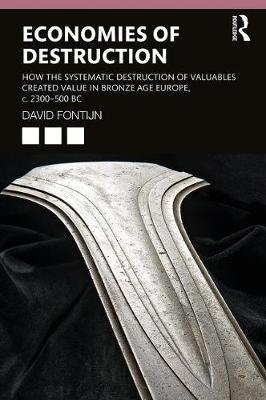Economies of Destruction

Economies of Destruction
This period is often seen as the time in which a `familiar' Europe took shape due to the rise of a metal-based economy. But it was also during the Bronze Age that massive amounts of scarce and recyclable metal were deliberately buried in the landscape and never taken out again. This systematic deposition of metalwork sits uneasily with our prevailing perception of the Bronze Age as the first `rational-economic' period in history - and therewith - of ourselves. Taking the patterned archaeological evidence of these seemingly un-economic metalwork depositions at face value, it is shown that the `un-economic' giving-up of metal valuables was an integral part of what a Bronze Age `economy' was about. Based on case studies from Bronze Age Europe, this book attempts to reconcile the seemingly conflicting political and cultural approaches that are currently used to understand this pivotal period in Europe's deep history. It seems that to achieve something in society, something else must be given up.
Using theories from economic anthropology, this book argues that - paradoxically - giving up that which was valuable created value. It will be invaluable to scholars and archaeologists interested in the Bronze Age, ancient economies, and a new angle on metalwork depositions.
PRP: 344.44 Lei
Acesta este Pretul Recomandat de Producator. Pretul de vanzare al produsului este afisat mai jos.
310.00Lei
310.00Lei
344.44 LeiIndisponibil
Descrierea produsului
This period is often seen as the time in which a `familiar' Europe took shape due to the rise of a metal-based economy. But it was also during the Bronze Age that massive amounts of scarce and recyclable metal were deliberately buried in the landscape and never taken out again. This systematic deposition of metalwork sits uneasily with our prevailing perception of the Bronze Age as the first `rational-economic' period in history - and therewith - of ourselves. Taking the patterned archaeological evidence of these seemingly un-economic metalwork depositions at face value, it is shown that the `un-economic' giving-up of metal valuables was an integral part of what a Bronze Age `economy' was about. Based on case studies from Bronze Age Europe, this book attempts to reconcile the seemingly conflicting political and cultural approaches that are currently used to understand this pivotal period in Europe's deep history. It seems that to achieve something in society, something else must be given up.
Using theories from economic anthropology, this book argues that - paradoxically - giving up that which was valuable created value. It will be invaluable to scholars and archaeologists interested in the Bronze Age, ancient economies, and a new angle on metalwork depositions.
Detaliile produsului









